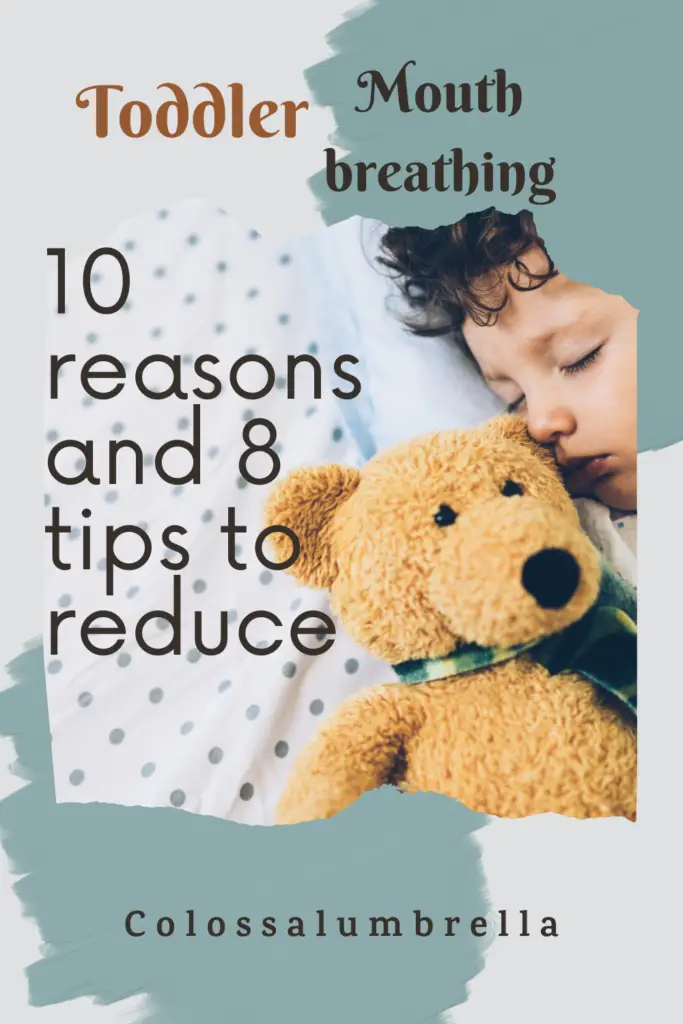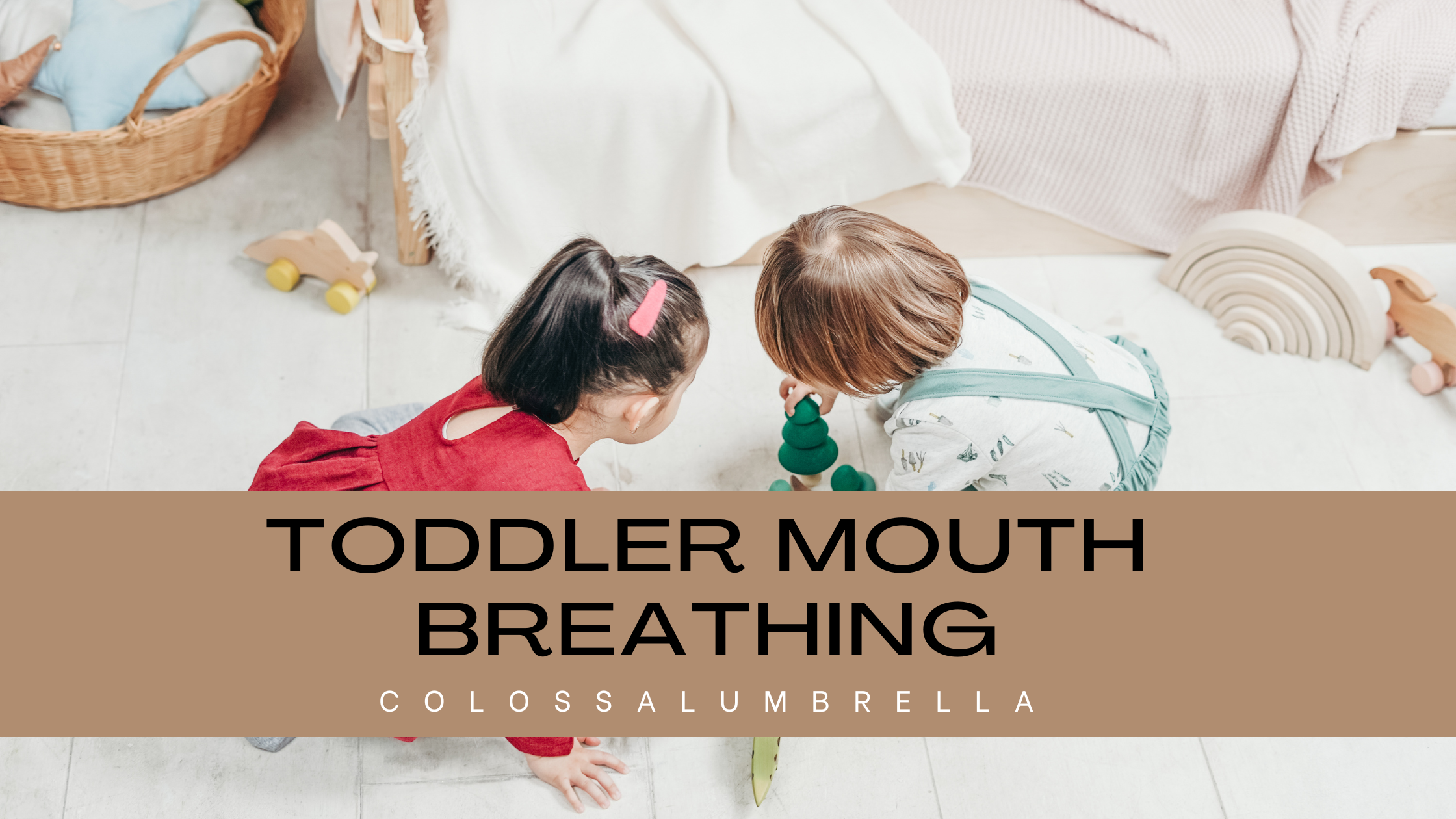You’ve probably noticed that your toddler mouth breathing instead of nasal breathing. You might have also noticed that it’s a frequent and continuous behavior, not just something he does occasionally. This is quite normal because this is the way little children breathe. Toddlers don’t have fully-developed breathing passages yet so they can’t breathe through their nose like adults. Instead, they must breathe through their mouth to get enough oxygen into their body.
However, there are times when this becomes an issue for your toddler that makes you wonder about toddler mouth breathing. Read on for more details about why toddlers breathe through their mouth, as well as how to deal with these situations and reduce the negative effects of breathing through the mouth at such a young age.
What is Mouth Breathing?
Open-mouth breathing is when you breathe primarily through your mouth rather than nose breathing. As a toddler, you primarily breathe through your mouth because your nasal passages are obstructed by your growing nasal bones and nasal cavity. As you get older, your airway obstruction clears and open up to allow you to breathe through your nose. Toddlers, however, haven’t reached that point yet and so they continue breathing primarily through their mouths due to nasal obstruction.
When Does Breathing Through the Mouth Become a Problem?
The medical community has not laid out a specific threshold for when to be concerned about mouth breathing. If your child’s mouth is constantly open, it’s important to pay attention and try to figure out what is causing it. Mouth breathing can be a sign of an underlying health condition, so it’s important to be vigilant and identify the cause. If you notice your child breathing through his mouth, you should consult your health care provider to rule out any health conditions that could be causing this behavior. If you notice chronic mouth breathing, it is recommended that you speak to your child’s pediatrician about any orthodontic treatment if required.
Mouth breathing can cause several issues, such as an increased risk of infection, obstructive sleep apnea, cavities and poor growth. It can also lead to speech problem, ear infections, and mood disorders, and make your child more prone to allergies. Mouth breathing can also cause your toddler to be tired and lethargic since he’s getting less oxygen and this will impact your child’s health. Open mouth habit can sometimes be a sign of a health problem, such as respiratory infections, allergies, asthma, cystic fibrosis, a tonsil or adenoid infection, risk of tooth decay, dental problems, or a sleep disorder.
Signs of mouth breathing
Mouth breathing is when the air that you breathe in comes into your mouth rather than your nose. This can affect how healthy your lungs and throat are. There are a few symptoms of mouth breathing to look out for if you think you might be mouth breathing. These include –
One of the most obvious signs is that your little one feels tired all the time. Having a lot of air trapped in the chest can put extra pressure on heart and make it work harder.
Your child may also find it harder to breathe out of your nose, especially at night when you’re sleeping. You may also notice noisy breathing. This is because the air that makes up the lower part of throat (your epiglottis) stays stuck together during sleep, making it harder to push out of mouth.
Finally, mouth breathing can make it harder to taste food properly. The reason for this is that saliva contains chemicals which help break down food so that we can taste it properly. If there’s too much air in mouth, these chemicals aren’t able to get past tongue and reach the back of throat where they should be heading. In some cases you might notice dry mouth as well.
5 Common reasons behind toddler mouth breathing
Most toddlers will naturally begin to mouth breathe when they start to yawn or suck on their hands, but you can help prevent this from happening by raising your child’s head and back during sleep time.
- Infection – This is the most common reason why toddlers breathe through their mouths. If your toddler suffers from stuff nose or chronic colds, this would lead to mouth breathing. Deep in their tonsils and adenoids, there is a high concentration of bacteria and viruses, which causes tonsil stones. These stones are very odorous, and the smell is what makes your toddler breathe through his mouth. If you notice your toddler breathing through his mouth and has a bad smell coming from his mouth, it could be a sign of a tonsil and adenoid infection. Check with your health care providers to determine the severity of the infection so they can prescribe antibiotics.
- Allergies – Toddlers often breathe through their mouths when they suffer from allergies. They may constantly cough and sneeze too.
- Air pollution – Your toddler might breathe through his mouth if he lives in an environment with high levels of air pollution, such as near a highway. Majority of children staying in polluted area might lead to chronic nasal congestion.
- Bad dental hygiene – Bad oral hygiene is another common cause of mouth breathing. If your toddler’s teeth are malformed or decayed, or if he suffers from bad breath and gum inflammation, he may be breathing through his mouth to avoid bad smells. In some situations, tongue thrust habit could lead to mouth breathing.
- Sleep apnea – Sleep apnea is a sleep disorder breathing that causes your child to stop breathing for up to 10 seconds while sleeping. If your toddler is breathing through his mouth and has a hard time sleeping, it may be a sign he suffers from sleep apnea.
3 Physical Activities that lead to toddler mouth breathing
Most children with attention deficit hyperactivity disorder breathe through their mouth rather than their nose. Below are some physical activities that are common reason behind mouth breathing –
- Swimming – Swimming is a great form of exercise, but it also introduces germs into your toddler’s mouth and nasal passageway. This can cause your child to breathe through his mouth, particularly if he doesn’t keep his head above water.
- Riding a bike – Cycling is a great way for your toddler to stay fit and healthy. However, it can also cause him to breathe through his mouth. This can be dangerous if your toddler is going too fast. Stay with your toddler when he rides a bike and make sure he slows down when necessary. If he still keeps breathing through his mouth when cycling, you can try a bicycle helmet with a face mask.
- Roller coasters – Roller coasters are an awesome way to have fun with your toddler, but they can also cause your child to breathe through his mouth.
2 Psychological Reasons behind toddler mouth breathing
- Anxiety – If your toddler is breathing through his mouth and has a tight expression on his face, it could be a sign of anxiety.
- Coping with stress – If your toddler is in daycare, he may be breathing through his mouth to cope with the stress of being around so many kids. If your toddler is breathing through his mouth and has a tight expression, you can help him relax by holding him and giving him a gentle massage on his shoulders and back.
How do I stop my toddler from mouth breathing?
- Make sure your toddler is getting enough sleep.
- Don’t delay naps or bedtime.
- Brush and floss regularly and visit the dentist for cleanings.
- Try a teething ring or frozen bagel with cream cheese.
- Freeze a wet towel and put it on their chest or place it over their face while they breathe through their mouth.
- Give them frozen veggies to chew on while they breathe through their mouth.
- Have them blow into a harmonica while they breathe through their mouth – it’ll be fun and help them learn how to breathe correctly.
- Practice breathing exercises with your toddler and remind them to breathe through their nose when they’re breathing through their mouth by saying something along the lines of “Big breaths in, big breaths out!” while they practice breathing exercises with you.

Conclusion
Breathing process through mouth is normal for a toddler, but there are times when it becomes a problem. If your toddler constantly breathes through his mouth and you notice he has a tight expression, you might want to try to calm him down. If you’re concerned that your toddler mouth breathing and it’s causing him harm, consult your healthcare provider to find the cause and get proper treatment. Important thing is to understand that toddler mouth breathing is normal but could be an issue if it turns in behavioral problems.
Also, make sure you monitor your toddler’s health and see your healthcare providers for physical examination if you think your toddler is breathing through his mouth because of allergies, speech impediments GERD, or obesity. Your toddler will grow out of mouth breathing habit as he gets older, but in the meantime, you can help him stay calm by giving him a massage, reading to him, and making sure he eats a healthy diet to develop a healthy immune systems.
